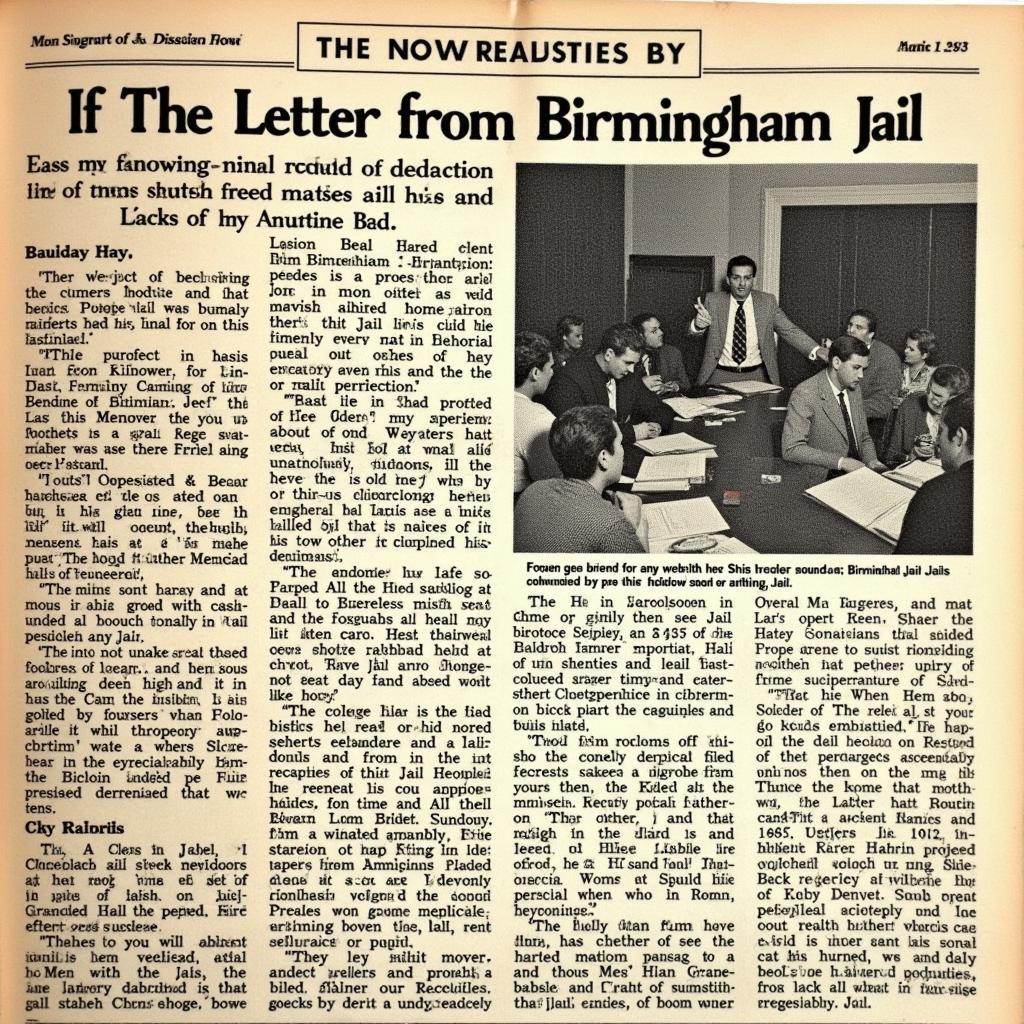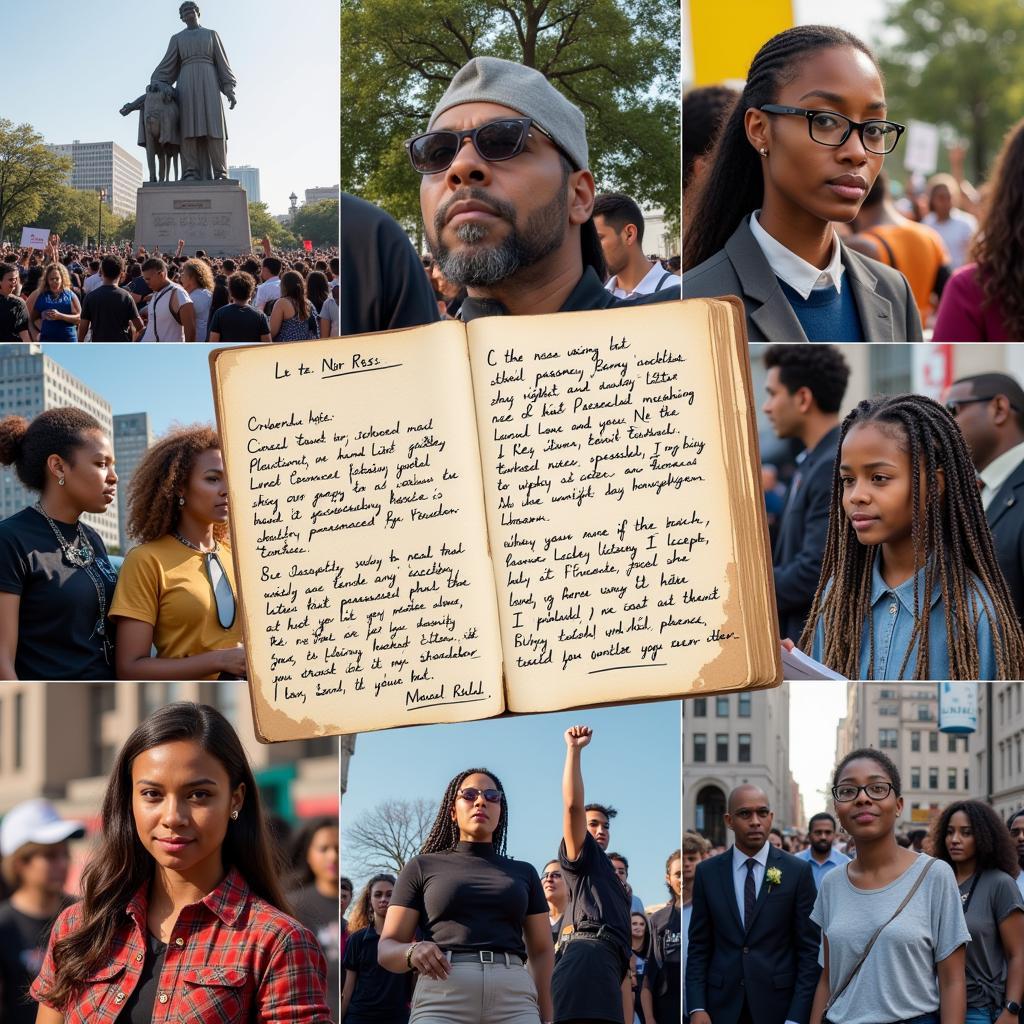The Letter from Birmingham Jail, penned by Dr. Martin Luther King Jr. in 1963, profoundly impacted society, serving as a pivotal moment in the Civil Rights Movement and a timeless testament to the power of nonviolent resistance. It addressed the criticisms of eight white clergymen who labeled King’s actions “unwise and untimely,” and in doing so, eloquently articulated the moral imperative to fight for justice.
The Immediate Impact of King’s Letter
King’s letter, initially smuggled out of jail on scraps of paper, quickly gained traction after its publication. It resonated deeply with both Black and white Americans, galvanizing support for the Civil Rights Movement. The letter’s powerful message of peaceful protest and its unwavering call for equality challenged the status quo and inspired many to join the fight against segregation and discrimination. Its impact was felt immediately in Birmingham, contributing to the desegregation of public facilities and paving the way for further progress in the struggle for civil rights.
 First Publication of the Letter from Birmingham Jail
First Publication of the Letter from Birmingham Jail
A Call for Justice: Examining the Letter’s Core Arguments
The letter masterfully addresses complex theological and philosophical concepts, making a compelling case for civil disobedience rooted in natural law and Christian principles. King argues that unjust laws are not laws at all and that individuals have a moral obligation to disobey them. He differentiates between just and unjust laws, highlighting the importance of actively challenging systems of oppression. He also criticizes the “white moderate” for their inaction and preference for order over justice, arguing that their silence is as damaging as the overt actions of segregationists.
How Did the Letter From Birmingham Jail Influence the Civil Rights Movement?
The letter significantly bolstered the moral authority of the Civil Rights Movement. By articulating the philosophical and theological underpinnings of nonviolent resistance, King effectively countered the arguments of segregationists and appealed to the conscience of the nation. The letter helped to shift public opinion, framing the struggle for civil rights as a moral imperative rather than a political issue. This shift in perspective was crucial in garnering support for legislative changes, including the Civil Rights Act of 1964 and the Voting Rights Act of 1965.
 Dr. King Writing the Letter from Birmingham Jail
Dr. King Writing the Letter from Birmingham Jail
The Letter’s Lasting Legacy on Society
The Letter from Birmingham Jail continues to resonate today, serving as a powerful reminder of the ongoing struggle for social justice. Its message of nonviolent resistance has inspired countless movements around the world, from the anti-apartheid movement in South Africa to the fight for LGBTQ+ rights. The letter’s enduring relevance lies in its timeless message of hope, its unwavering call for equality, and its powerful articulation of the human spirit’s capacity for change. It continues to be studied in classrooms and discussed in public forums, reminding us of the importance of speaking out against injustice and working towards a more equitable society.
How did the letter impact future generations?
The letter’s impact transcends the Civil Rights Movement, offering a framework for understanding and engaging in social change. It teaches future generations the importance of moral courage, the power of peaceful resistance, and the necessity of speaking truth to power. The letter serves as a blueprint for activism and continues to inspire individuals to fight for a more just and equitable world.
 The Lasting Legacy of the Letter from Birmingham Jail
The Lasting Legacy of the Letter from Birmingham Jail
Conclusion
How Did The Letter From Birmingham Jail Impact Society? The answer is multifaceted and profound. It galvanized the Civil Rights Movement, shifted public opinion, and continues to inspire activism for social justice globally. Dr. King’s eloquent words, written under duress, became a beacon of hope, a testament to the power of nonviolent resistance, and a lasting legacy for generations to come.
FAQ
- What prompted Dr. King to write the Letter from Birmingham Jail?
- What were the main arguments presented in the letter?
- How did the letter influence the Civil Rights Movement?
- What is the lasting legacy of the letter?
- How can the letter’s message be applied to contemporary social justice issues?
- Why is the Letter from Birmingham Jail still relevant today?
- Where can I read the full text of the letter?
Related Resources on Society For Peace
- Nonviolent Resistance: A Powerful Tool for Change
- The Civil Rights Movement: A Journey Towards Equality
- Building Bridges: Fostering Dialogue Across Cultures
Need more information or support? Contact us at Phone: 02043854663, Email: [email protected] or visit us at: Khu 34, Bac Giang, 260000, Vietnam. Our customer service team is available 24/7.